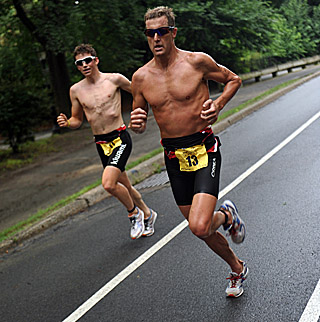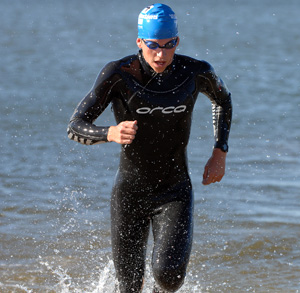What makes cycling prodigy Andrew Yoder run?
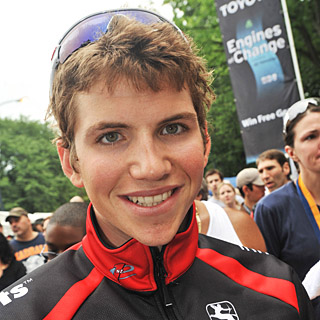
"The bike was incredibly hard," said Greg Bennett after winning the Nautica New York City Triathlon. "That Yoder! Hats off to him. Holy crap! What an awesome athlete."
"That boy is incredible," said Matt Reed. "Every race he's done has really impressed me. I think he should go straight to cycling."
Andrew Yoder’s performance at the most recent Nautica New York City Triathlon underscored and amplified his reputation as one of the hottest cyclists in Olympic distance non-drafting triathlon. After coming out of the swim-bike transition 35 seconds back of leader Andy Potts and Life Time Fitness Toyota Series stars Greg Bennett, Matt Reed and Stuart Hayes, Yoder blazed into the lead just 5 miles later on his way to a race-best 56:37 — two minutes faster than Bennett, 2:50 faster than Potts, and 3:07 faster than Reed – renowned non-drafting cyclists all. In fact, Yoder’s bike split was faster than every other world class elite cyclist except for a batch of slightly faster times on a draft-legal, shorter course in 2001, the first year this race was held in New York City.
Yoder’s modest demeanor and far-from-imposing 5-foot 8-inch, 138-pound physique leave many of non-drafting triathlon’s top performers wondering where he gets such massive power to the pedals. He lacks Normann Stadler’s massive quads, the leverage of Craig Walton’s decathlete’s musculature, the finely honed greyhound power of Chris Lieto, the explosive, cut bod of Greg Bennett. Perhaps some of his advantage comes from his unassuming package. Although at age 20 he is the youngest contender in the Life Time series, he looks even younger. More like the shy, 15-year-old prodigy rock writer at the center of the Cameron Crowe character semi-biopic Almost Famous..
Yoder talked about his rise to elite non-drafting triathlon cyclist in a telephone interview from his Lancaster, Pennsylvania home last week.
Slowtwitch: When you were 15, you started working with coach Charlie Foltz and embarked on a series of junior level ITU races. How did those ITU draft legal races go?
Andrew Yoder: I tended to struggle because I did not have that natural speed on the run. I’d be out in the front pack in junior races, made a break on the bike or pull them through the bike in draft legal races. I might get on the podium if my break succeeded. But if they all stuck with me in a bunch on the bike, I simply could not run with the best guys in the country for 5k.
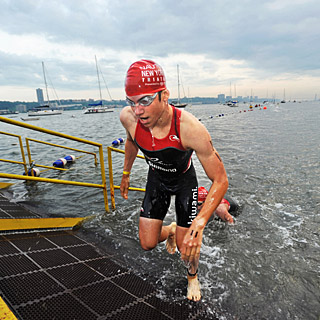
ST: This seems to lead you toward non-drafting racing?
Andrew: I had a good swim and a solid run but every race back then my bike kept getting better and better. So my passion for triathlon was non-drafting.
ST: Were you starting to meet or compete against the best practitioners of non-drafting?
Andrew: When I first saw Matt Reed, Andy Potts, Hunter Kemper and Greg Bennett at some races, they just looked like animals to me. They were very intimidating. I was a 15-16 year old kid and these guys were on magazine covers. They looked unstoppable. I did not think I could get to that level ever. But I kept working day in and day out training and kept improving through 2006. In 2007, I turned pro.
ST: What was the race that made you think you might just belong with the animals, er, the best non-drafting pros?
Andrew: In May 2007 I won overall amateur at the Columbia Triathlon. I beat Chris Martin, who had won the Best in the US overall title and a guy named Joe McDaniel, who is a really good runner. I held all the amateurs off and I placed 4th overall with the pros. That was my last amateur race and my biggest amateur win. It was great for my confidence because the only guys who beat me were Craig Alexander and Greg Remaly, and that race convinced me to turn pro. [In that race, Yoder’s 1:02:33 bike was 4th fastest behind Remaly (1:00:17) and 2006 ITU Duathlon World Champion Leon Griffin (1:01:55).
ST: How did your first pro race go?
Andrew: My first pro race was Philadelphia in 2007. Craig Alexander was there. I remember coming out of the water in the front pack. I was really intimidated but I got on the bike and I rode really well and I stayed with Craig, who won the Ironman 70.3 World Championship the previous year, the whole ride. I came off second and it made me think: If at 17 I can ride with Craig Alexander, I could do a lot in the sport. At that point, I thought it was all about confidence and experience and belief. I thought: Now you can race with the best.
ST: In that race, your 57:59 split was third best behind third place David Thompson (57:25) and Alexander (57:45). How did you finish?
Andrew: I fell back on the run and finished 7th overall. But still it was a great finish in a fairly good, big field. I ran 36:54. So that was good after I rode my heart out on the bike. And I thought Yes, you have to respect them, but you can never put those guys on a pedestal.
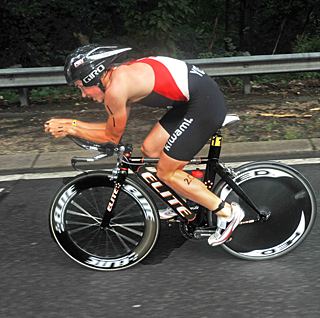
ST: Once you got past those first giddy moments as a pro, how did you settle in for the rest of 2007?
Andrew: From there I did some big city races, In New York City I had a good race and finished 7th again [with an 8th-fastest 1:02:50 bike – 3:21 slower than third overall finisher Craig Walton and 3:17 slower than overall winner Greg Bennett]. I was a mid-pack pro, nothing special. I learned from each race what you can do better and to pay attention how other guys race and how they pace themselves.
ST: Since your high school cross country and swimming were always beset my injuries, did anyone in your high school know you were a rising nationally ranked triathlete?
Andrew: Some people knew that I was doing triathlon, but no one at high school knew at what level I competed. I didn’t feel the need to go talk about it. People knew I did triathlons but they didn’t know what it was exactly. Some wondered if it has something to do with rowing.
ST: What was your next time you raised your level?
Andrew: At the 2008 Columbia Triathlon, I blew away the field on the bike until Chris Lieto showed up. I was happy I could hang with him halfway, then he dropped me. [While the rest of the field was 4-6 minutes slower on the bike, Lieto out split Yoder, 56:35 to 58:34] I finished second to Lieto and I held off Chris McCormack on the run. [Yoder ran 36:55, Chris Lieto ran 35:21 and Chris McCormack ran 34:58] so I felt that was not bad at all. When I stood on the podium with a two-time World Champion, I decided to race pro instead of going to school.
ST: When did you have the final showdown with your parents about forgoing college?
AT: In the winter of 2008, my senior year in high school, I was accepted to the Penn State University main campus. But I did not know what I was going to study. That was one of the big reasons I chose to not go to college and focus on professional triathlon.
ST: Was that a stressful time with your parents?
Andrew: My dad is a family physician and my mom is a nurse and they are both well educated and wanted to see me do well in school and get a real good job. They saw college as the pathway to the future. Penn State is a good school and a great opportunity. They wanted me to go to school for the academics and social life. They wanted me to meet people as part of my development as a person.
ST: Did they see this coming?
Andrew: I think they struggled sometimes. My senior year in high school I started to get real serious about triathlon, I was almost obsessed. I put all my energy in triathlon and put school on the back burner. I wanted to race pro as a career at that point, but it was hard to come out and say I will not go to college.
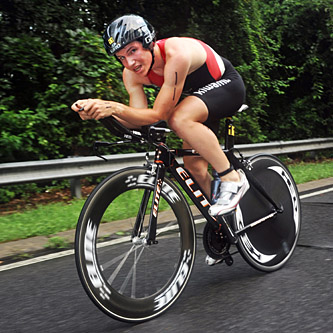
ST: What kind of volume and intensity of training do you do?
Andrew: At this point, a typical week’s training includes 20k in the water, 200 miles on the bike and 30 to 40 miles on the run. With running, I do one hard interval workout at the track, and a tempo run on crushed gravel trails. On the bike, I’d do a hard interval and a tempo ride and all my intensity then and now is done on a CompuTrainer. I like it because I can be completely in control and I think it is a cornerstone of my success on the bike. It’s a wonderful thing, the best tool, it makes you strong. Using the CompuTrainer my bike fitness went through the roof and it gave me the chance to line up with the best in world at the Life Time Series races.
ST: Some of your early heroes comment that they are surprised that an individual of your modest size can put out such big power on the bike?
Andrew: I am 5-8 and I weight 138 pounds. Power to weight ratio is the key to my success. Now I am very conscious that have to be very strong while I have found my weight sweet spot. I know if I’m at a certain point with my weight at 138 and put out certain power, I know I will do well.
ST: Your legs have a ton of power, but they aren’t massive quads like Normann Stadler or TJ Tollakson. Describe your legs.
Andrew: They are definitely not chicken legs. I’m very strong but not overly muscular. I definitely have power. I think you have to be strong to race well in non drafting. The non drafting athlete is all power and speed for two hours. Andy Potts is a strong muscular guy and also lean – that is the key.
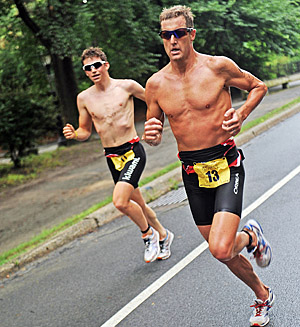
ST: You had some troubles at the beginning of this year?
Andrew: The beginning of this year was frustrating. I did well at Miami (4th) and Columbia (2nd), but then had a terrible period just before Philly. I had been sick with allergies that started when I went to a training camp in Victoria, British Columbia. I didn’t know my home stay had a cat and my asthma flared up. They were great people at my British Columbia home stay and it wasn’t their fault. I struggled to try to train but I was wiped out. So I left that camp frustrated and lost two weeks and changed coaches when I went home after the camp.
ST: Who is your new coach?
Andrew: Cliff English. Now I connect via phone and email, but my plan is to go to Tucson in the winter. I think and talk a lot with Cliff. The big thing in getting the most out of a coach-athlete relationship you need to train in person and that is why I’ll head down there this winter.
ST: How did things turn around this year?
Andrew: Going into the Philadelphia Triathlon, I didn’t know what to expect. I had to draw confidence from my finishes at Miami and Columbia. In Miami, I didn’t start in lead. I passed Matt Reed for the lead halfway through the bike, and maintained it to T2. He had a better swim but I out split him by a minute and a half and ended the bike with a 30 second advantage. Chris Lieto shadowed me the entire bike, and came around me with a mile to go and was first off the bike. By the finish, I was 4th. At Columbia, I was two minutes ahead of Terenzo Bozzone off the bike and finished 2nd, 10 seconds behind at the line.
ST: When did Terenzo catch you?
Andrew: At Mile 4.5. Then I managed to stay with him a while because he had to really dig deep to catch me. I do not consider myself a runner yet but I need to change that mentality. When Terenzo Bozzone came by I had to throw that conception out the window and said to myself I will stay with him. If he had been fresh, he might have been gone like the Road Runner. He gapped me a bit when he went by, but I hung there and he could never open the gap much further.
ST: What did you take away from your duel with Bozzone at Columbia?
Andrew: It was a huge hurdle to be able to run with a world class runner. He is top tier in the sport and I gave him a run for his money as I did with Matt Reed and Chris Lieto in Miami.
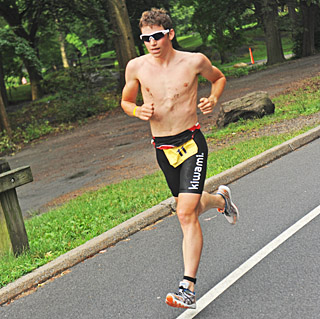
ST: So what happened in your duel with David Thompson at Philadelphia this year?
Andrew: I went up against David Thompson last year and this year at the Philadelphia Triathlon. It was the same scenario both times. I had about 1 minute on him in the swim. I outrode him by 45 seconds and had a 1:45 advantage going into the run. Then he ran me down and passed me at mile 5. [In 2008, Yoder out-biked Thompson 53:41 to 56:00; in 2009 Yoder out-biked Thompson 55:32 to 56:26. In 2008, Thompson ran 33:52 to Yoder’s 35:48; in 2009 Thompson ran 33:45 to Yoder’s 36:35] Both years, same story. Last year seemed like a better result for me. This year I was disappointed.
ST: So how did you get ready for New York?
Andrew: I’d started to burn out a bit. I was very disappointed with my race in Philadelphia and I took a week off to refresh mentally. It was the best thing could have done. By the time a week rolled around I started a high-volume, high-quality two and a half weeks of riding.
ST: What did you think going into New York 2009?
Andrew: I knew New York would have a top level field with great triathletes – especially Bennett, Potts and Reed. But I think it is really the Big Four including Stuart Hayes, who won Chicago last year. I came off Philly disappointed by thinking this was a new race and I felt ready. I knew the course and was primed. But even though I was optimistic, there was a big question in my mind. Every time I had raced Bennett in the past, he always destroyed me on the bike, and this was his course.
ST: How did the race develop?
Andrew: I started in the front pack on the swim and got out well. But after the swim, I lost 15 seconds in the half mile run to transition and lost touch with the group. So I was by myself for the first 5 miles and digging deep. Andy (Potts) had gotten away and Greg (Bennett), Stuart (Hayes) and Matt (Reed) were all riding really strong and were all together. I eventually reeled them in. Then I had to decide whether to recover for a while or just blast through.
I went.
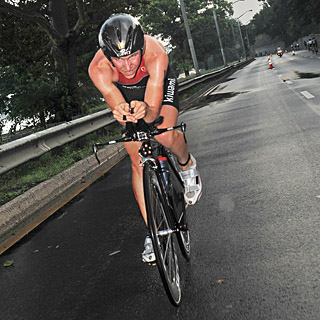
ST: How do you pace yourself in a race. Do you use a power meter?
Andrew: I don't race with a power meter. I race by feel. I train with a power meter with wattage on my bike computer.
ST: What is your maximum watt output?
Andrew: I won’t tell you what my maximum wattage is. I think it is a weapon for me and the other guys should not know what I am putting out.
ST: OK, so how did you get by them?
Andrew: I just went for it at Mile 5 or 6. I had bridged up from 35 seconds behind in that first 5 miles – a fairly flat section. By the time I caught them the course was starting to go into the rollers in the Bronx section. I knew this would play to my strength, but I had to get out of sight. From the moment I took off, I think they went into panic mode and didn’t know how they should react. I didn’t look back and every roller I went as hard as I could.
ST: How do you evaluate this result?
Andrew: My 1:47 finish time was 7 minutes better than last year at the same race. I came within three miles of beating the best non drafting triathletes in the world. When I think about it, it gets me out the door training. Because I know now they work really hard too. But once I learn to run it will be a battle with them. I won’t just be hanging on, I’ll be a contender every race.
ST: Any thoughts whatsoever about becoming a cyclist?
Andrew: I think about it a lot and I have considered it, especially when the Tour came on I wondered if I should be a cyclist. I want to be one of the greats in the sport. I think have a chance in triathlon and that's where I’ll be devoting all my focus and energy in the near future.
ST: What would be the steps to switch to cycling?
Andrew: I have no idea. I don't know how cycling works, I know no one in USA Cycling and don’t know the path you need to take to reach pro cycling. My size suits being a very good climber, and perhaps would work well in the time trial. So I can be a contender, but there is so much more. If I go to cycling, that first few years must be dedicated to do the little things. Pack riding in the peloton, racing in road races and criteriums, learning how to expend energy over a multi day race. There would be so many learning struggles. No matter how good you are, there are many obstacles you need to overcome before you make it. I think I have the power and work ethic to be a cyclist or triathlete.
ST: Floyd Landis is from your neck of the woods — Pennsylvania Dutch country.
Andrew: It’s pretty bizarre we are both from there. Floyd and his parents are Mennonite. Even though my last name is Yoder, my dad and our family are not Amish.
ST: What do you think of Landis?
Andrew: Floyd is a great cyclist and came from very humble beginnings.
ST: What do you think about his doping positive, the loss of his appeal and ultimate disqualification at the Tour de France?
Andrew: One of the things that drives me away from cycling is the fact that there is always a suspicion. Say I go to cycling and win the Tour and I am clean but people will still think I am doping. I think triathlon is pretty clean and that is one of the things I like about it. With Floyd it is hard. He grew up in a very conservative family and he is a good guy. I met him once pretty early on at a banquet he put on to show supporters why the drug tests were wrong. It is hard for me to judge the man.
ST: Can you succeed and win a world championship without drugs?
Andrew: I will never use drugs. I could never live with myself. But when you get to the top level of cycling and triathlon and you are in your 30s, the pressure is on to make money for your family and your kids. But ultimately, if you think you cannot do it naturally, you ought not to be in the sport. For me drugs are just not an option.


